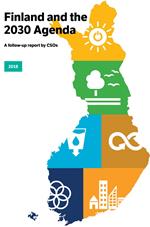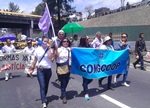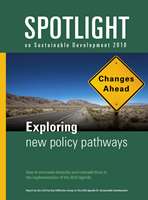Social Watch E-Newsletter - Issue 337 - October 22, 2018
Published on Mon, 2018-10-22 12:35
 |
| Issue 337 - October 19, 2018 |
|
|
Social Watch reports
Spotlight report on the 2030 Agenda
|
|
|
| |
|
| |
Finland does not see its footprint
|
| |
|
| |
 |
KEPA; the Finnish platform of civil society organizations, worries about the extraterritorial impact of Finland's production and consumption patterns.
“Almost half of Finland's water footprint is caused by production chains outside Finland” they argue as an example. Kepa reports that “there is no reliable or even partially comprehensive information available in Finland on the external impacts of Finnish consumption, i.e., how we exploit natural resources outside of our own country”. The Finnish Ministry of Finance initiated an assessment of the national budget from a sustainable development perspective. However, the initial work is judged “quite modest”. The budget proposal for 2019 is going to be estimated mainly from the climate change perspective, and will focus on the plans for Finland to become carbon neutral after having reached a historic high in carbon emissions in 2017. Kepa considers it “necessary to widen the approach of taking sustainable development into account in the budget planning” to cover other issues and “to look courageously at tax support for fossil fuels and other activities that may even conflict with sustainable development.” Read more
|
| |
|
| |
|
| |
Guatemala fails to tax
|
| |
|
| |

Photo: CONGCOOP
|
In Guatemala the main complaint about the State is its absence. “We have the sensation that there is no government,” reports Helmer Velazquez, director of the cooperatives and NGOs association Congcoop, “because taxes are so low and the 'state captors' don't even pay them, thanks to tax exemptions or plain avoidance, which leaves the mortgage of natural resources as the only funding source.”
“This wouldn't be a problem if we didn't have seven million people living in poverty: Half of the population! And poverty is extreme for three million of them. Very calm, the government reported in 2017 ‘institutional progress’ by linking the SDGs with the national development plan K'atun 2032. In substantive terms, nothing.”
Fiscal reform and a reorientation of public expenditure are demanded by civil society, which proposes massive investment in family agriculture as the way to unleash virtuous circles on employment and food and thus meet the goals and targets set for 2030. Read more
|
| |
|
| |
|
| |
SDG 1: Mobilize the financial means for social protection systems for all
|
| |
|
| |
 |
There is no doubt that social protection is a key instrument to end poverty and to give people access to opportunities for a self-determined life in dignity. National social protection systems can also contribute to achieving other SDGs, including food security, good health, decent work, gender equality, reduced inequality and cohesive communities.
Even for countries that have the political will to close the gap and the organizational capacity to implement the required policies, a major challenge is to mobilize and maintain the necessary resources to cover the cost in a sustainable way. Social protection spending is not a short-term effort but needs to be planned and guaranteed for the indefinite future. The social protection target is ambitious as there is an extremely wide gap between the commitment and the current situation. Mobilizing adequate public resources to cover the cost of social protection floors and social protection in a wider sense is a challenging terrain on the international as well as the national level. And yet, the challenge can be met because the requisite techniques and mechanisms of public finance exist. They will have to be implemented to guarantee that nobody is left behind. Read more
|
| |
|
| |
Social Watch publishes country reports 2018
Social Watch coalitions around the world are contributing their assessments and reports to the global Social Watch report 2018 on the national implementation of the 2030 Agenda. While circumstances and capabilities are unique in each country, common threads emerge: Inequalities, often exacerbated by the international policy framework, are not being reduced, poverty is underestimated or hidden but not eradicated, sustainability is sacrificed to extractivism.
The Social Watch national platforms are independent coalitions of civil society organizations struggling for social and gender justice in their own countries. The Social Watch network has been publishing since 1996 yearly reports on how governments implement their international commitments to eradicate poverty and achieve equality between women and men.
|
| |
|
| |
|
| |
|
| |
What role for the people in public private partenerships?
|
| |
|
| |
 |
Over the last months multinational corporations have jumped from the ‘economy and business’ pages of world newspapers to the sections on ‘crime and police’: Volkswagen was found guilty of programming its cars to cheat on emission tests enabling it to contaminate while on the streets way beyond the acceptable limits. The sugar industry was exposed as having a long record of fake scientific research aimed at blaming other factors for the health problems that they create. Goldman Sachs helped the Greek government in 2001 to lie about the state of its economy, in order to be admitted into the Eurozone. Between 2012 and 2015 the most powerful banks of the world, including Barclays, Chase Morgan, Citibank, Deutsche Bank, HSBC, Lloyds, Royal Bank of Scotland and others, paid billions of dollars in fines for having manipulated for their own benefit the exchange rates among global currencies and the Libor interest rates that determine the cost of billions of credit operations around the world every day. Read more
|
| |
|
| |
|
| |
United Nations: Crisis in multilateralism unfolding since UNCTAD-14
|
| |
|
| |
 |
A crisis in "multilateralism for trade" has been unfolding in the two years since the fourteenth ministerial meeting of the United Nations Conference on Trade and Development (UNCTAD), the head of the organisation, Dr Mukhisa Kituyi, has said. "One of the casualties appears to be progress at the WTO," he added.
This came at a meeting of UNCTAD's Trade and Development Board (TDB), where Dr Kituyi, the Secretary-General of UNCTAD, presented the mid-term review report on the implementation of the Nairobi Maafikiano. The Secretary-General recalled that the Maafikiano gave UNCTAD a unified mandate - cutting across divisional boundaries, calling us to work more closely with each other, and with other entities. It was a first in the UN system in terms of setting a work programme on SDG implementation and the actions it spells out clearly define UNCTAD's strengthened role, supporting gainful economic growth, multilateralism for trade and development, productive capacities for structural transformation, and implementation of the Agenda 2030. Red more
|
| |
|
| |
|
| |
Gender gaps in social protection
|
| |
|
| |
 |
Worldwide, more than half of the global population is not covered under any type of social protection scheme, and less than 30 per cent enjoys comprehensive social protection. Women are particularly disadvantaged in social protection systems, experiencing lower coverage rates and substantially lower benefit levels. This is due, in part, to the fact that social protection schemes have often been designed around a male breadwinner model, assuming an uninterrupted and full-time career in the formal economy. This tends to penalise women – who are significantly underrepresented in the formal labour market, over represented in informal employment, earn less than men, and experience greater interruptions in their careers due to caring responsibilities. As a result, women are often excluded from contribution-based schemes and leaving them completely unprotected in the absence of social protection floors. This brief by ITUC explores the policies that have been shown to be helpful in reducing gender gaps in social protection: which include measures to reduce barriers to women's labour market participation, measures to tackle the gender pay gap, supporting the transition to the formal economy, crediting periods of care in social security contributions, and guaranteeing adequate, universal social protection floors. Read more
|
| |
|
|
|
| |
|
SOCIAL WATCH IS AN INTERNATIONAL NGO WATCHDOG NETWORK MONITORING POVERTY ERADICATION AND GENDER EQUALITY Social Watch >>
Social Watch E-Newsletter For comments, sugestions, collaborations contact us at: socwatch@socialwatch.orgTo stop receiving this newsletter send a message with the subject "unsubscribe" to: socwatch@socialwatch.org |
|
|
|
SUSCRIBE TO OUR NEWSLETTER
Submit
|
